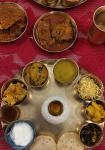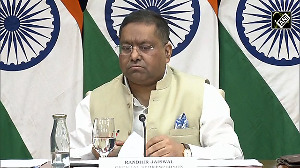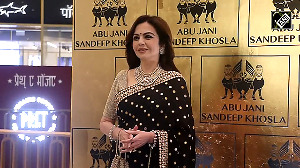Indian cricket's latest pin-up boy Mahendra Singh Dhoni might have become a top-grade soccer goalkeeper had he not strayed into the willow-cherry game.
 Starting his sports career as a goalkeeper in school, the Ranchi lad's keeping skills between the posts had prompted the coach then to ask him to don the keeping gloves of cricket and the rest is history. What was soccer's loss turned out to be cricket's gain.
Starting his sports career as a goalkeeper in school, the Ranchi lad's keeping skills between the posts had prompted the coach then to ask him to don the keeping gloves of cricket and the rest is history. What was soccer's loss turned out to be cricket's gain.
"He was a good football goalkeeper during school days. In one of the cricket matches he was asked to keep wickets. He allowed only four byes," cricket coach Chanchal Bhattacharya said.
Agreeing with Bhattacharya, Dhoni's father Pan Singh said: "My son used to play as a goalkeeper in colony football matches. He switched over to cricket after he was asked by the coach".
The 23-year-old's exulting stroke play reminds the old-timers of another wicketkeeper-opener of Bihar Daljit Singh, who had displayed free stroke making in 1960-70.
Dhoni, the first international cricketer from Jharkhand is also the latest from the undivided Bihar which has produced players like Saba Karim, another wicketkeeper, Subroto Banerjee, Ramesh Saxena and Randhir Singh.
A student of DAV School and now in the Gosnar College, Dhoni, who had set ablaze the Visakhapatnam stadium with a scintillating 123-ball 148, is a good student too.
R E Singh, the former principal of DAV Shyamali where Dhoni was a student, said right from the school days, he was sincere and hard working.
Dhoni's father said he has always encouraged his son and never interfered in his goals.
Bhattacharya said Dhoni's fireworks had started in the first class cricket a couple of years ago, when he hammered the experienced Karnataka bowling attack containing pacers Venkatesh Prasad, Doda Ganesh and spinner Sunil Joshi during a Ranji Trophy match in Ranchi.
"Dhoni is known for his attacking strokes which was proved in the Visakhapatnam one-dayer," Bhattacharya said.
The cricketer said he remembers the pain and sacrifices his parents had made for his sake and he would forever remain indebted to them.







 © 2025
© 2025